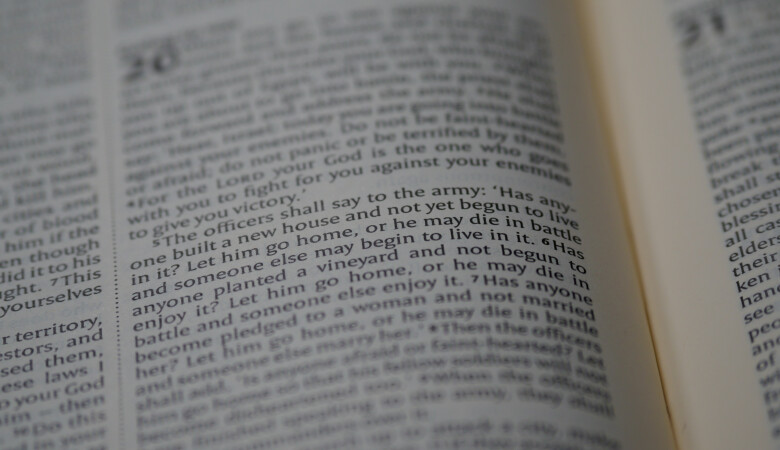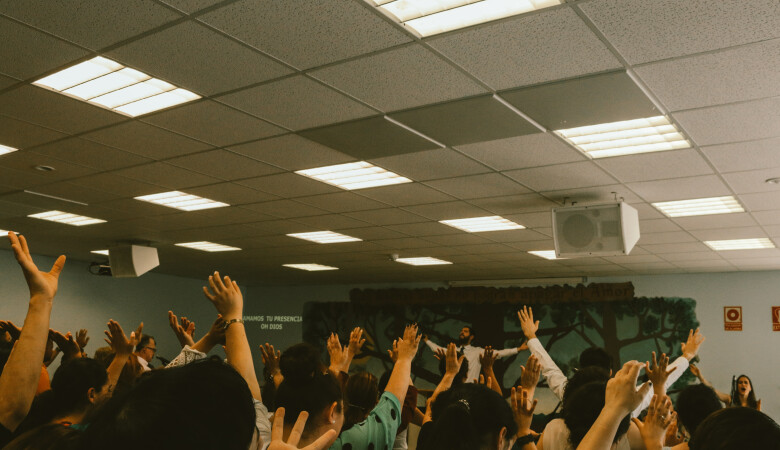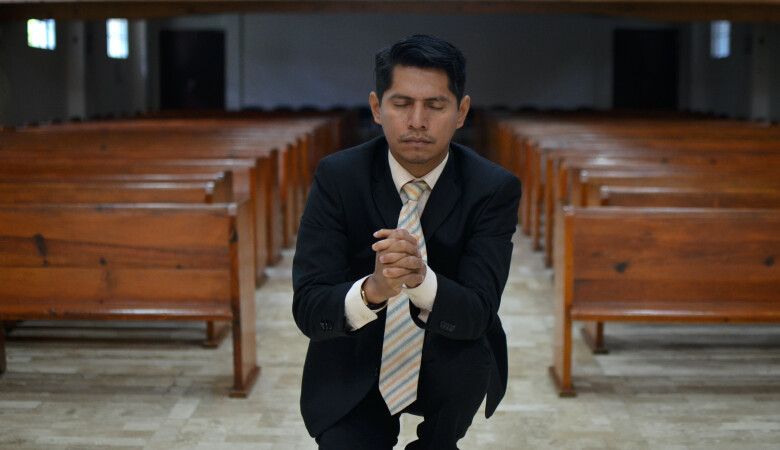The First Murder: Sin Advances in the World
September 26, 1999 | Andy Davis
Genesis 4:1-26
Grace, Worship, The Power of Sin, Judgment, Animal Sacrificial System
Introduction: Relentless Advance of Sin
I'd like to encourage you now to take your Bibles and turn to Genesis chapter 4, we continue in our series through Genesis. And I have to tell you just a word of personal encouragement. I'm so glad to be through the first three chapters, just because of the incredible amount of material that there is in Genesis 1-3. Genesis 4 preaches a little bit more simply, and so we can just concentrate on a few things, but you could write books on all the things that we've covered in Genesis 1, 2, and 3. So just rest easy, we'll be able to get through this chapter with God's help and see, hopefully a number of the themes that are in here.
Recently, as I was doing research for my sermons in Genesis 1, 2 and 3, I looked at a Time Magazine which I showed you, which had a cover article on evolution. I'm not going to say a word about evolution today, but there was another article in this Time which caught my eye, and it really was striking to me. And the name of the article was, "Is Any Place Safe?" And it's talking about the money that local schools, public schools, are spending to keep the schools safe, in light of all the things that have happened recently. There have been five, maybe six, I've really kind of lost count at this point, violent attacks in public schools in the last 18 months. Isn't that incredible? When I was growing up, this would never have entered my mind. School had other dangers, there were other things that we had to watch out for, but the bullies, all they did was beat you up, and you just knew not to go home that way. You went the other way, alright? And so, there was violence then, but it was a different kind, and it had its power, but this is just unbelievable. It's tragic, isn't it? And it's talking in here about the different things that schools are doing, like putting up a perimeter fence, some of them with barbed wire on them. Can you imagine a child going to a public school feeling like they're in a prison? But it's not to keep them from getting out, it's to keep evil from getting in. Isn't that terrible?
And then microdots, tiny microfilm hidden inside expensive equipment, so that it can be identified if stolen. Or cameras in black boxes in various places to keep records of misdeeds. Screamer boxes, transparent shields are installed over the fire alarm pull stations and when the front cover is lifted a very loud local alarm sounds. I think this is connected to what happened in one of these schools when an 11-year-old pulled the fire alarm, got everyone out and then started shooting. Do you remember it was... And I think it was in Jonesboro, Arkansas. And as a result, they put in these screamer boxes. The swipe test, you have a substance, a paper, which is swiped over your hand and if the paper turns purple, it shows that there's evidence of specific drug use. This is in public school. And each one of these has a certain price tag to it. How about this one? The hand geometry reader. It measures the height and width of your fingers and compares the information to an internal database so that you can't get in the school unless your hand is already in there.
Isn't it sad? And what I'm seeing as I read through this, is the advance of sin in my lifetime, as I look at it, it keeps getting worse and worse. Do you sense that? Do you sense the momentum as things are moving on and not just in the area of violence, but we see it in terms of television. There was an article this week in USA Today, about them pushing the envelope in terms of what they'll show on television in terms of intimate relations. They keep pushing the envelope more and more, and we just don't want to do much about it, we don't wanna say... Some people will write letters, but they just keep pushing it back. Have you noticed that? Do you see what's happening? The advance of sin. Sin is a relentless monster. When it comes in, it doesn't want to stay right where it is, it wants to move on, it wants to develop. To use a medical term, it wants to metastasize. I had to practice that three times this morning, so I'd say it properly.
Like cancer, it wants to spread through the body. It's not going to stay in one place, and none of us should think that we can just play with sin and think it's going to stay at one level. It's going to keep pressing on to the next level. And that's the lesson that we get here in Genesis chapter 4. Genesis 4 is more than just the story of the first murder. Do you realize how far we've come from Genesis 3 to Genesis 4? In Genesis 3, they committed a sin and it was terrible. I told you that I thought Genesis 3:6 is the saddest verse in the whole Bible, terrible thing that was done. But here in Genesis 4, we have Cain boldly lying to God about his sin, and what was his sin? It was a cold-blooded murder of a righteous man. Do you see how quickly we've devolved, how quickly we've fallen apart from the original goodness that God intended? And it is tragic.
And as we look through this, we see this. But you know, if you look a little more carefully, even in this chapter, which I think is dedicated to the development of the seed of the serpent, whereas chapter 5 is the development of the seed of the woman. In chapter 5, the lineage leads to Jesus Christ, eventually, and in chapter 4, the lineages of Cain and the seed that he set up.
And so we get those two tracks, the seed of the devil, the seed of the serpent, and then the seed of the woman. And there's always going to be hostility it said in the curse on the serpent. There's always going to be fighting between the two and the first indication is here in chapter 4 But the grace of God is here as well. In this chapter, it's what we call common grace. The kind of grace that's given to everybody, the righteous and the unrighteous, the wicked and the good alike. Get the grace of God. And it comes back again to that line in Romans chapter 5, in which Paul says, “Where sin abounds or increase, grace abounds or increase even more.” Sin will not have the final word in human history, amen. Praise the Lord.
And it's not going to have the final word in your life either if you're a believer in Jesus Christ. Though you wrestle, though you fall, though you stumble, in the end you will triumph. In Romans 16, “The God of peace will soon crush Satan under your feet.” Amen. So, that's so encouraging.
Cain’s Sin
But this is not, overall, an encouraging chapter. It's a very sad chapter as we see sin developing. What I'm going to do now is I'm going to read verses 1-8 and stop and comment on them and then move through the chapter in that fashion. Chapter 4:1, “Adam lay with his wife Eve, and she became pregnant and gave birth to Cain. She said, with the help of the Lord, I have brought forth a man. Later she gave birth to his brother Abel. Now, Abel kept flocks and Cain worked the soil. In the course of time, Cain brought some of the fruits of the soil as an offering to the Lord, but Abel brought fat portions from some of the firstborn of his flock. The Lord looked with favor on Abel and his offering, but on Cain and his offering, he did not look with favor. So Cain was very angry and his face was downcast. Then the Lord said to Cain, Why are you angry? Why is your face downcast? If you do what is right, will you not be accepted? But if you do not do what is right, sin is crouching at the door. It desires to have you, but you must master it. Now, Cain said to his brother, Abel, let's go out to the field. And while they were in the field, Cain attacked his brother Abel and killed him.” Let's stop there.
At the beginning of this, in verse 1 and 2, you see a little insight into what's happened with Eve since she fell into sin in chapter 3. As I told you, God was going to institute somewhat of a divorce between the serpent, representing Satan and evil, and the woman. There was not going to be a lasting alliance there. I think the serpent wanted to make a permanent alliance between him and the human race. God said, I'm going to divide that right away. And so, Eve has come back to the fold here… I think.
Eve’s hopeful ministry
She says, “With the help of the Lord, I've gotten a man.” Isn't that kind of an interesting way to say that? I think the first time I read it, I think she didn't know what a baby was, she'd never seen a little baby, you know? Adam and Eve were fully formed when they were created, but here's a baby, and some people believe that this is... some commentators, that she calls him a man. I think it actually goes a little deeper than that, I think she's looking ahead to the serpent slayer at this moment. I may be wrong on that, but I think that she's looking at that promise that was given in the curse on the serpent, “he will crush your head.” Remember that? The seed of the woman would come along to crush your head, and hopefully she's saying, maybe this is the one. Oh, that she doesn't know, thousands of years of history would have to go before the full plan would be unfolded, before Jesus Christ would come.
So she was so hopeful and she names him Cain. Cain — “with the help of a man.” And by the way, this is a little bit of a note here that... an indication that they spoke Hebrew back then. That the original language was Hebrew, because it doesn't really make sense for her to call him Cain if they didn't speak Hebrew. The word I have gotten or I have obtained in Hebrew is Kaniti. And so, Cain's name is a Hebrew name, and so it's every indication that that original language was Hebrew. So you're all going to have to learn Hebrew before you get up to heaven. But there'll be little classes there, so you'll be able to converse up there, it won't take long, trust me. Your minds will be perfect and you'll pick it up. I had to labor over it and I still have trouble with it, it's very difficult, but at any rate, they spoke, and they spoke Hebrew. And so Eve continued in her fruitfulness. She brought forth Cain and then came Abel. Now, I think reading between the lines, I don't really have any idea if Abel was Eve's second son, the Bible doesn't say so. It just says that he was born after Cain.
I think they had many sons and daughters, there's all kinds of things that are not recorded here in the early chapters of Genesis. There's a whole development, but God is picking out certain things and He wants us to see it. He's focusing on certain things. And it's interesting, Cain's name is a hopeful name, but Abel... the name Abel means vanity or emptiness. And it could be as she's seen things developed, she's starting to lose that hope maybe, that she's feeling that life is empty and that it isn't going to come in her lifetime. And it wouldn't come in her lifetime, and so she's discouraged, but see how wrong she was. Cain, the hopeful one was the murderer, and then Abel, who she calls vanity, is the righteous one, the one who is up in heaven now, according to Hebrews chapter 11. And so she calls him vanity. So these two sons, and the stage is set for this first murder. It says that Abel kept flocks and Cain worked the soil.
Offerings of Cain and Abel
Now, commentators on this say that no meat was eaten by people before the flood. Before the flood, that we didn't eat meat. Humans didn't eat meat, they just ate the vegetation that God had provided. I'm not very clear on that, but it's quite possible. So then why did he raise flocks? Why did Abel raise the flocks? Well, perhaps for wool, for clothing, but even more, perhaps for sacrifice. For sacrifice. Remember I told you in chapter 3 at the very end, God provided a covering for Adam and Eve? Wouldn't be that fig leaf covering but an animal skin, so it's an indication of sacrifice, and it's not very long after that that we get the sacrifice. And here in Abel, Abel offers the fat portions from his flock. And so very early in human existence we've got this animal sacrifice, and we know from the book of Hebrews that that's pointing ahead to what? It's pointing ahead to Jesus Christ, the giving of his life, the blood sacrifice of Christ on the cross for our sins. And so they're both working at an honorable task, Abel keeping flocks and Cain working the soil.
Now, Jesus tells us in Luke 11 that Abel was a prophet. I bet you didn't know that. Abel was a prophet, God spoke through Abel. And the reason that you need a prophet is because now there's a kind of a separation between God and people. He's not going to be there all the time, and so now he begins to raise up individuals to speak, to speak in his name and say, this is what God wants us to do. But Jesus called Abel a prophet. And the way I kind of put this whole thing together is that Abel raised flocks for sacrifice. God spoke through him and told Cain, through Abel, God wants an animal sacrifice, so when you want to offer a sacrifice, come to me and I'll give you an animal. And Cain didn't want that,. He wanted to do his own thing. He wanted to offer his own stuff to God. He wanted to offer his own first fruits. And he didn't want to listen to the Word that was coming to him from the prophet. And this is what Jesus said to those who are persecuting him, he said which of the prophets did you not persecute? Everyone who has come and spoken in the name of the Lord, you have persecuted in some way, everyone. And Abel was the first.
God’s acceptance and rejection of offerings
But the real issue here is not whether God would accept the sacrifice from the soil, God does. In the Mosaic covenant, God accepts grain offerings and other things. It's not that there was something intrinsically wrong with a grain offering, it's that something was wrong with Cain's heart. Really it's the heart behind the offering that means everything. Even if you offered animal sacrifices back then, if your heart wasn't right, God said, I don't want it. I have more than enough, he says in Isaiah 1, of your rams and burnt offerings and sacrifice, I want your heart. I want what's happening inside you. And so it says that God looked with favor on Abel and on his offering, but did not look with favor on Cain and his offering. So it's a matter of the person first, then the offering. He searches the heart, and he looks at it. It says in 1 Samuel 16:7, “Man looks at the outward appearance, but God looks at the heart.” And I think the real problem with Cain was his heart. As we will see.
Also in 1 Samuel 15:22, “Does God delight in burnt offerings and sacrifices as much as in obeying the voice of the Lord? To obey is better than sacrifice and to heed is better than the fat of rams.” And so it is an issue of obedience. Look at verse 7, what did God say to him in verse 7? To Cain he said, if you do what is what? “If you do what is right, will you not be accepted?” Doesn't that imply that Cain had disobeyed? I think it really does. God had told Cain what he wanted and Cain disobeyed and brought his own sacrifice, his own offering. And so Abel's offering was made by faith. And it was made in obedience from a natural outflow of a righteous life, a desire to walk with God, not perfect. Abel was in the image of his father, Adam, he had original sin, he was a sinner, he was not a perfect man. But he offered up a good sacrifice because it came from a pure heart.
Hebrews 11:4, “By faith, Abel offered God a better sacrifice than Cain did. By faith, he was commended as a righteous man when God spoke well of his offerings and by faith he still speaks.” That's a prophet, by the way. By faith, he still speaks, even though he's dead. He still teaches us about the righteous life, doesn't he? As we read his account now, the real issue, the core issue here is that God has the right to tell us how He is to be worshipped. H e has that right. He has the right to lay down the rules by which He is to be approached. We can't just blunder into the throne room of God on our terms in our own way, and think it's going to be acceptable to God.
No, he says. You need a blood sacrifice, you need to be cleansed. And now in this new covenant we understand fully you need the sacrifice of Jesus Christ to cleanse you, or your sacrifices and your offerings will not be acceptable to me. You need to come in my way, on my terms, and that's through faith in Jesus Christ. And that's the way we draw near to God. God has the right to declare one offering acceptable and another offering not acceptable. Hebrews 12:28 says this, it says, “Let us be thankful, and so worship God acceptably with reverence and awe for our God is a consuming fire.” What does that imply? There is unacceptable worship. It is possible to come into God's presence in a way that's unacceptable to Him, and Cain is the first example of this.
Now, much of the law of Moses was given to ways that we should come to God, or ways that the Israelites would come to God acceptably. Do you know how many rules and regulations there are about worship in the Old Covenant? Look in the Book of Exodus. I've talked about reading through the Bible... Reading through the Bible in a year or whatever. People say, “Oh, when I get to Leviticus, it just wears me down.” Well, there's lots of good things in Leviticus. There really are. But I always had a hard time in Exodus. After all that exciting stuff, whatever, you start getting into the description of the tabernacle, all the rules and regulations about the rings and the curtains and all that, and I started bogging down a little bit, truth be told. Now, as I learn more about it, I see the beauty of it. But God has an awful lot to say about worship, doesn't He? It seems like there's more rules about that than anything else in the old testament covenant.
Cain’s reactions; the seeds of murder
So, He has the right to say self-styled worship is an abomination to God; the idea that God is obligated to accept anything we throw His way. No, that's not the way it is at all. We come to Him on His terms, the way he has said. Now, Cain is not at all pleased with this is he? This is a bad development for Cain. Look at his reactions, and in his reactions we see the seeds of murder. We see the seeds of murder.
First reaction that Cain had, you have to read between the lines and look at some other scriptures, but it's jealousy. He was jealous of his brother. In 1 John 3, it says, “So this is the message you heard from the beginning, we should love one another. Do not be like Cain who belonged to the evil one and murdered his brother.” By the way, John says, he belonged to the evil one. What does that make him? The seed of the serpent. He's part of that seed of the serpent. He belonged to the evil one, and he murdered his brother. And why did he murder him? Because his own actions were evil and his brother's were righteous? Jealousy. He's jealous of his brother. Same reason they killed Jesus. Pontius Pilate said so you remember? He knew that it was out of jealousy that they had handed Jesus over to him. They were jealous of Jesus. And so it is in this way. So the first reaction is jealousy.
Not far behind jealousy there was what? Anger. He's angry. Now, when I preached the Sermon on the Mount, I told you about anger. Jesus said, “You've heard that it was said, Do not murder, but I tell you what, do not be angry.” You see, because Jesus knew that the seed of murder is anger. So he's talking about anger. The Hebrew says, literally that Cain glowed or grew hot. There's a connection between heat and anger, and you start getting hot. You ever talk about getting hot under the collar? Alright, I'm hot right now, but it's not because of being hot under the collar. That water back there is quite warm, isn't it Robin? It's like a sauna. I'm still trying to recover, but at any rate, in this case, it's anger burning inside him. He's jealous and it makes him angry and he grew hot.
And this is the first appearance in Scripture of the scourge of unrighteous anger. And all of us wrestle with this to some degree, don't we? It says in James chapter one we should be slow to get angry. Slow to get angry. Man's anger does not bring about the righteous life that God desires.
Well what's Cain's third reaction? It says that his face fell. What does it mean that his face fell? Well, he became discouraged, he got depressed, he got down, he feels rejected, there's no energy in him to make it right. He’s just down. There's a regret that does not lead to repentance and that's what we see here. Now the Book of Proverbs tells us that if we rebuke a wise man, the wise man will get energetic about his life and make some changes, but if you rebuke a fool, he'll just get angry, upset and begin to criticize and shoot the messenger in effect. And that's what happens here. Proverbs 9:8 says, “Do not rebuke a mocker or he will hate you, rebuke a wise man and he will love you. And so God comes to him and begins to minister.”
God’s complete ministry to Cain
Now, in verses 6 and 7, we see a beautiful ministry between the Lord and God, and there's a four-fold aspect of this ministry that I see in the whole ministry of the Word of God to us. There are four things that God's word does consistently. And God does them here for Cain. They are diagnosis, encouragement, warning, and exhortation.
The first is the diagnosis. Look what he asked him. God comes to him and he says, “Why are you angry? Why has your face fallen?” Why are you discouraged? So He begins to uncover the sin, like a surgeon He begins to move into your heart and open up what's in there. The word of God does search us that way, doesn't it? Hebrews 4:12 says, “The Word of God is living and active, sharper than any double-edged sword, it penetrates to the dividing of soul and spirit, joint and marrow, it judges the thoughts and attitudes of the heart.” And so, he's doing this diagnosis, he's trying to pull out the anger, saying, think about what you're doing right now. Diagnosis.
The second stage is encouragement. Look what he says, “If you do right”... The NIV is too tame. If you do right, will you not be accepted? The Hebrew actually says, If you do what is right, will you not be exalted? Isn't that incredible? If you do what's right, I will lift you up into my very presence. This is a promise from God, isn't it? Humble yourself under God's mighty hand that He may lift you up in due time. He's going to raise you right up into His presence. Is that grace or what? What a promise. If you follow my ways, if you obey me, I will lift you back up into Eden. You can eat from the tree of life. You can be with me. There is a way for you. It's the way of obedience and submission to my ways. It's another way of perfection for Abel. He’s not a perfect man, but he says to Cain, he makes him a promise, he encourages him with a promise, “If you do what is right, will you not be exalted?” The grace of God.
And isn't it interesting that God knew very well what Cain was going to go do? He knew who he was talking to. Have you ever had a quiet time or a prayer time and just felt the grace of God just coming to you, and then you got up from that and went off and did something awful? That's happened to me before. And I think, God, how can you treat me this way? How can you be so good to me when I'm just about to go sin and you knew full well what I would do? But that's the way God is. He comes to us with that grace and He's ministering to Cain and giving him a promise.
But He doesn't stop at that promise does He? He gives him a warning. What does he say? He says, sin is crouching at your door. What image pops in your mind when you think of that? I think of a lion or some kind of a wild beast, right outside the door. Sin is crouching, it's waiting for you. It's right at your door and it desires to have you. Remember we saw this word back last chapter, in that curse on Eve. our desire is for your husband and he will rule over you, remember?
It's a desire, not a loving kind of thing. It's a desire to dominate. Sin wants to dominate you Cain. Sin wants to take you over. So He's giving him a warning. Sin desires to have you. It's crouching at your door. The word of God does that for us too, doesn't it? The word of God comes to us and warns us about sin. 1 John 2 says this, “I've written all these things to you so that you may not sin.” Sin is the enemy of your life, and so he gives us that warning.
And then the fourth is an exhortation. You must master it. You must conquer. You must win. Or we could even say, if it's a wild animal, you must kill it. You have to kill sin. John Owen, the Puritan theologian wrote a book called “On The Mortification of Sin.” You know the word mortification means, means putting it to death. He's talking about putting sin to death, and this is what he says: The vigor, power, and comfort of our spiritual life depends on the mortification of sin.
You want a strong Christian life, you want a powerful... You want comfort in your life? Put sin to death. If you give in to sin, you'll have none of those three, it's just that simple. And so, Owen likens it to the quarrel with the vipers. I've told you before walking along the road, you see that viper, that's serpent, you don't begin the quarrel unless you intend to kill the snake, because he's not going to let you... You can't say, look, half-time, I'm going to go this way, you go that way. It's not going to happen. You start to walk away, he'll get you, alright? And you're in a battle now with sin. Either sin's going to win, or you're going to win. But there's never going to be any surrender between the two of you. You surrender, you lose. You've got to kill the sin. And that's what he's telling Cain. So the comprehensive ministry of God here to Cain, he does everything for him. Just like God said in reference to Israel, what more could I have done than I did for you? And you sinned anyway.
And then in verse 8, sin gives birth to death and it's so sad. Despite all that God had done, sin still has the victory. Never underestimate the power of sin. It is a potent foe. It is devious, it's tricky and deceptive, and it comes and moves in powerful ways. And Cain becomes very much like Satan at this point. Hey, let's go out to the field. He's becoming deceptive, he's becoming tricky. He has no intention to go for a nice walk with his brother, he's going to kill him, and so he's being deceptive, and he kills him, he does. He rises up and kills his brother. James 1:14 says, “Each one is tempted when by his own evil desire, his own evil desire, he is dragged away and enticed. And then after desire is conceived, it gives birth to sin, and sin when it is full-grown gives birth to death.” There's a development, you know, it starts small and gets bigger and bigger and bigger, not just in society, not just with killings in public schools, but in your life, it's the same way. Start small and it starts to take over. Move more and more.
Cain’s judgment
And so that's what happened to Cain. In verses 9-16, we see the judgment, and judgment does come, and it's inevitable. In verse 9, the Lord said to Cain, Where is your brother Abel? I don't know, he replied, Am I my brother's keeper? Oh what a tragic response. The Lord said, “What have you done? Listen, your brother's blood cries out to me from the ground. Now you're under a curse and you are driven from the ground which opened its mouth to receive your brother's blood from your hand. When you work the ground, it will no longer yield its crops for you. You will be a restless wanderer on the Earth. Cain said to the Lord, my punishment is more than I can bear, today you are driving me from the land, and I will be hidden from your presence. I will be a restless wanderer on the earth and whoever finds me will kill me. But the Lord said, him not so. If anyone kills Cain, he will suffer vengeance seven times over. Then the Lord put a mark on Cain so that no one who found him would kill him. So, Cain went out from the Lord's presence and lived in the land of Nod, East of Eden.”
This is a judgment day, and just like we had in chapter 3, who is it that initiates the judgment day? It's God who comes and brings it about. God knows that day, we don't know when it's going to happen. Each one of us has a day of our death when we have to face judgment. For all of us who are Christians, we know that we will not be judged for our sin, but we don't know that day, do we? And we sure don't know the day of the second coming of the Lord, we don't know. God initiates that judgment after his patience has run out. And he comes and he says to him, where is your brother Abel? Again, with the question, it's a question he brings to him, Where is your brother Abel? Well, this time Cain lies straight out. Adam and Eve didn't lie. Now they passed the buck, they did the blame-shifting thing, but they did not lie. Cain just lied. He said, I don't know where he is. So he knew very well where he was, he buried him. He buried him.
And he says, Am I my brother's keeper? That's a pastoral term. A m I my brother's shepherd, is literally what it is. Am I supposed to shepherd my brother? Perhaps a little bit of a jab at God for all his fixation on animal sacrifice. Why wasn't my grain good enough? Am I my brother’s shepherd? He's the shepherd, go ask him. You see. Oh, the evil that is coming out here. And I think this question, “Am I my brother's keeper” has permeated our society, hasn't it? We are atomized (???) in America today, we are individuals. We are living not in community anymore, we don't care that much about one another. We have a “live and let live” philosophy. What do I care if my brother falls into sin? What do I care if he is tempted or struggling with something? Doesn't matter to me, that's his problem, live and let live. And I don't want anyone come and tell me what to do. that's the attitude, am I my brother's keeper?
Part of the opposite of that is intercessory prayer, isn't it? We should be praying for one another. Our covenant, our church covenant says, we will watch over one another in brotherly love. What image do you get with watching over? Don't you get a kind of a shepherding picture? We're supposed to shepherd one another. It's supposed to matter, if somebody else is struggling with sin. It’s supposed to matter. Well, the sovereign judge isn't going to waste any time with this lie, he knows exactly what's happened. And he asked him the same question he asked Eve. In verse 10 he said, “What have you done?” And again, he doesn't wait for the answer, God knows everything and Abel's blood is crying out for revenge. He said, Listen, your brother's blood cries out to me from the ground. Have any of you ever read The Tell-Tale Heart by Edgar Allan Poe? Remember that story and that murderer is sitting there and the inspector is there with him and he's hearing the murders, hearing the beat of the heart, the beat of the heart, and he thinks for sure the inspector can hear it, and he doesn't know why he can't hear it.
Well, it's pounding in his own mind, his own conscience testifying against him that he's a murderer. The inspector can't hear it, but he can. But God can hear it too. And he said, listen, don't you hear the sound? The blood is crying for revenge, he's crying for vengeance, very much like Revelation chapter 6, “I saw under the altar the souls of those who had been slain, because of the Word of God and the testimony they had maintained. And they called out in a loud voice, How long sovereign Lord, holy and true, until you judge the inhabitants of the Earth and avenge our blood?” Are they rebuked for this question? No, they're not rebuked at all, they're just told to be patient. It's coming. I will avenge. Romans chapter 12 said, it is mine to avenge, I will repay. And so, this long history of the seed of the serpent, persecuting the seed of the righteous one, persecuting, persecuting one martyr after another. God has noted it all and its blood cries out for revenge.
And so then he judges him. He puts Cain under a curse. The open rejection of God and the banishment from the ground. He's driven from the ground and he is to be a restless wanderer at that point. Do you realize how demonic this is? Do you remember what Job was doing in Job chapter 1,when God called him or he came into his presence? He said, Job, where have you been? And what did Job say? Well, I'm just kinda roaming and wandering on the Earth. Alright, that's what he does, he's got nothing else to do except cause trouble moving from place to place. How about the demons? In Matthew 12:43, Jesus said, “When an evil spirit comes out of a man, it goes through arid places seeking rest and does not find it.” Restless roaming around, that's what a demon does, and now that's what Cain is. He’s a kind of like a demonic person moving around with no real purpose on earth.
Ultimately, he's driven from God himself, and this is the ultimate punishment, isn't it? None of these other things matter, but to be driven from God, to be away from God is to be away from everything good, that's the real pain of hell, is that you're away from the presence of God, and God in the presence of God is every pleasure and every good thing. Well, Cain complains at this point, he says, Whoever finds me will kill me. This is talking to someone about vigilante justice, I think. Anybody who finds me as soon as they see me, they'll kill me. I think Cain's conscience is working on him, he's beginning to think I've brought murder into the world, now they're going to come after me. And what God says, it's not so. Anyone who touches you will be punished seven-fold. I think the number seven is significant. In other words, divine judgment will come. It's up to me to judge the murderer, it's not up to a vigilante group of people that take it on themselves. There's going to be order and structure to how murder is going to be handled.
In Genesis 9, we'll get to this more later, in which he institutes human judges. If any man sheds blood by man shall his blood be shed. We'll get to that in chapter 9, but at this point, he's saying, no seven-fold judgment, meaning I'm the one who does it. Not so. And so, he puts a mark on him. Do you ever wonder what that mark was, the mark of Cain? Maybe it was something on his head, or I don't know what it was. But I don't really think it's anything physical. I think the Hebrew indicates it's more of an oath or a promise that God will not allow vigilante justice take over the Earth, and so he takes to wandering.
Cain’s City
Now, in verses 17-24, just covering it quickly, it says, “Cain lay with his wife and she became pregnant and gave birth to Enoch. Cain was then building a city and he named it after his son, Enoch. To Enoch was born Irad, and to Irad the father of Mehujael, and Mehujael was the father of Methusael, Methusael, the father of Lamech.” Lamech married two women, one named Adah and the other Zillah. Adah gave birth to Jabal. He was the father of those who live in tents and raise livestock. His brother's name was Jubal, he was the father of all who play the harp and flute. Zillah also had a son to Tubal-Cain, who forged all kinds of tools out of bronze and iron. Tubal-Cain's sister was Naamah. Lamech said to his wives, Adah and Zillah, listen to me, wise O Lamech hear my words. I have killed a man for wounding me, a young man for injuring me. If Cain is avenged seven times then Lamech, 77 times."
Oh, we've come so far from the garden of Eden at this point, it's so terrible and so tragic. Here in verses 17-24, we get Cain's city. Cain is building a city. In my mind, I tend to link murder and cities. I think it's just because statistically an overwhelming number of murders are committed in cities. So it shouldn't surprise us that the first city is established by this murderer, Cain.
But where did it come from? The population came from Cain and his wife. Uh-oh, wait a minute, stop right there. Where did Cain's wife come from? Ever hear that one before? Where did Cain get his wife? Well, there are tough questions, and then there are easy questions. This is relatively easy. If you accept the fact that the entire world came from one married couple, Adam and Eve, and that's what the scripture openly teaches, then in Acts Paul said, from one man he made every nation of men, and Eve is called the mother of all living. So that settles that. So that means that, yeah, brothers and sisters got married way back, there's no other way to get around it. What else can you say? You say, eww. Well, things were just different back then, because understand that disease and sickness had not come in and not begun to affect the genetic code to that level.
And so, later in the law of Moses, you could not marry your sister or your brother, could not be done. But at that early stage there's no other way for a Bible-believing Christian to come to this conclusion. So, I don't know that Cain's wife was his sister, it could have been a third or fourth generation. Realize, these people lived a long time, and it could have been Eve's great, great, great granddaughter. We don't really have any idea, but he got a wife and he married her and they started having children. And he establishes a city. Now, in verse 17 Cain's intention is, I think, to build a city in his own honor. He names it after himself to some degree, even though his son... He's living through his son, and in effect, he's establishing or dedicating the city to himself. And so, we see the seed of the devil multiplying in chapters 18 and 19,. You could almost call it a kingly line or a genealogy of who's going to be in charge of Cain city, and it culminates in this evil man, Lamech.
Now, what's so evil about Lamech? Two things, bigamy and boastfulness. Bigamy and boastfulness or boastful pride. Bigamy, because he's the first man that broke that pattern of one man, one woman for life, one flesh. That pattern that God had set up. He's the first one, so he's got two wives. And then he says, listen to me, I've got something to say. I killed a man for wounding me. He's a tyrant. Somebody hurts me or slaps me on the cheek, I'm going to kill him. So he's got this arrogant dominance, like a tyrant. He's the king of his city and he's going to run it the way he wants. I think you can just almost skip over chapter 5, right to chapter 6, and see the connection between this tyrannical attitude at the end of chapter 4 and the beginning of chapter 6, when the flood comes. We'll get to that in a couple of weeks, but this attitude is taking over, and he is like a dominant dictator, tyrant type, and how far we've come from Eden at this point.
Now, as we look through this chapter, we have seen the multiplication, or should I say the metastasizing of sin. It has moved on, it has reached new heights or new depths really. It's gotten to the point where we've got dominant dictator tyrant types marrying whoever they choose, and killing whoever they choose, and in this terrible way sin has reached this level. And yet the grace of God is still there, what we call common grace blessings. We’ve got Jabal with his animal husbandry, he's going to learn how to nurture animals, God taught him how to do that. And then you've got this guy, Jubal. So Bill, you should be grateful for Jubal. He's the first musician that we get in the Bible, and we get all of music developing... And you can really summarize this in terms of entertainment and all those things that bring pleasure and comfort to our toils in life. And God gives that common grace blessing as well.
And then Tubal came. Metallurgy first, but then even more tool making, tool making. We are tool makers. According to the evolutionists, they say that's what separates us out from the rest of the beasts. We can make tools, that and the fact that we have this opposable thumb. Those things, tool-making, language, the opposable thumb. I say, no, it's that we're in the image of God, and all those other things flow out from that. But we are tool makers. A little while ago, I don't know if you remember, Garry Kasparov, the chess champion, was defeated by the IBM big blue computer. Remember that? Computer finally beat the chess champion. And everybody was making a big deal about this. I thought, what's the big deal here? Can Michael Johnson, the 200-meter champion beat a motorcycle in a race? I'd like to see that. Or one of those little dragsters you know, and have Michael Johnson right there and let's just do it, alright?
We are used to taking our bodies and developing things with our minds that do what our bodies do better. If God had meant us to fly, we'd have had what? Wings. Well, God gave us a mind, we're able to develop technology so that we can fly right here in this state where it all began. Alright? God gives technologies, He gives the tool-making ability. Which mechanic is going to take his own hand and reach out and turn that lug, that nut and change the tire by... I'd like to meet that man, he's going to reach for a wrench. Tool-making and all of these common grace blessings. It says in Matthew 5:45, “God causes the sun to rise on the good and the evil, and sends rain on the righteous and the unrighteous.” The grace of God. The grace of God will always have the final word, even in a terrible chapter like this one, the grace of God. In this case, common grace blessings.
Applications:
How do we apply this scripture, this text? Number one, God's standards for worship. We can't just come to God the way we want. Come to God through Jesus Christ. Come to God through the blood that Christ shed on the cross, or you cannot come to God at all. We come to God through Christ. And number two, if you are a Christian, take God's warnings against sin seriously. Fight sin with everything you have, struggle against it, wrestle with it. If you fall, confess your sin, but keep fighting it. And note the way that sin grows, use it is a warning, as sin comes into your life. It’s not going to stay in one place. It's going to move on, it's going to develop just like we see in this chapter. And then understand God's grace and his patience even to the wicked. We're going to develop that theme even more in chapter 6, where God gives 120 years for the human race to settle their affairs. God is patient and God waits graciously.






























